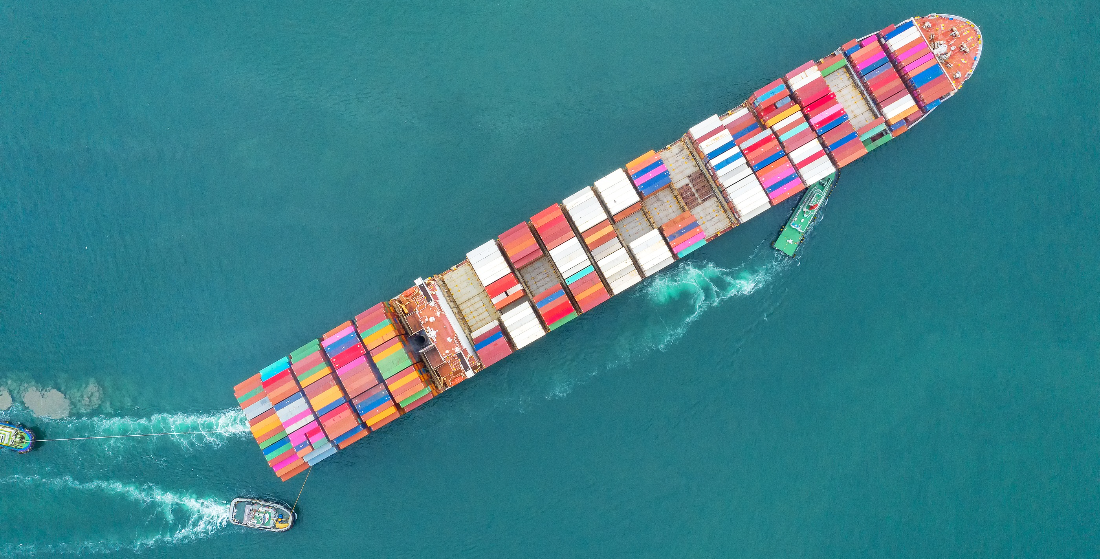Fallout of Suez blockage brings trail of claims
The Ever Given container ship has been ‘arrested’ and the Egyptian authorities are demanding massive compensation. And with the Japanese owners of the ship declaring ‘general average’ there is now a virtual minefield for shippers and insurers to navigate. We explore some of the potential issues.

When the MV Ever Given - an ultra-large container vessel (ULCV) - ran aground at 7am on 23 March and completely blocked the southern end of the Suez Canal for nearly seven days it was inevitable that there was going to be significant fallout with severe disruption to a big chunk of global seaborne trade. The incident severely delayed the passage – north and southbound - of more than 400 ships transiting the canal and caused many others to divert around Africa. But few probably realised the full legal and insurance ramifications of the incident which has led to a series of prospective claims and counter claims.
At 400 meters in length the Ever Given is one of the largest ULCVs in the world and is carrying 18,300 containers. The vessel weighed 224,000 tonnes when she entered the canal, and was travelling from China to Rotterdam when the accident happened. When the ship was successfully re-floated on 29 March after a monumental effort involving extensive dredging and several tugs working round the clock, it was then towed to Great Bitter Lakes, part of the canal north of the original blockage point and just south of Ismailia, to undergo a full inspection.
Following the extensive inspection, in mid-April the vessel was given clearance for onward passage to Port Said. However, at this point, the Suez Canal Authority (SCA) began arrest procedures against the vessel (not the crew). The arrest was granted by an Egyptian court, and the Ever Given remains anchored in Great Bitter Lakes with its entire cargo.
The SCA made a compensation claim of $916 million against the vessel’s Japanese owner, Shoei Kisen Kaisha. The vessel is currently under charter to Taiwan’s Evergreen Line. The SCA has said compensation is needed to cover “great moral damage”, losses of transit fees, damage to the waterway during the dredging and salvage efforts, as well as the cost of equipment and labour. Somewhat astonishingly, on 9 May, the SCA said it would reduce the claim to $600 million. It is unclear how the 30% reduction of the claim was calculated. But whatever the legalities are relating to the arrest of the vessel, it would appear there is a much more complicated insurance-related issue around this whole episode (see below).
At the time of the grounding of the vessel, the ship’s insurer - UK Club for Protection and Indemnity – issued a statement declaring: “The UK Club has insured the owner of Ever Given for certain third party liabilities that might arise from an incident such as this – including, for example, damage caused to infrastructure or claims for obstruction. The vessel itself and its cargo will have been insured separately.”
And when the Ever Given was ‘arrested’ in mid-April, UK Club and the ship’s technical manager Bernhard Schulte Shipmanagement (BSM) said they were bitterly disappointed that the ship was being held. The initial compensation claim from SCA was understood to include $300 million for a “salvage bonus” and $300 million for “loss of reputation”.
“Despite the magnitude of the claim, which was largely unsupported, the owners and their insurers have been negotiating in good faith with the SCA,” said UK Club in a statement. “On 12 April, a carefully considered and generous offer was made to the SCA to settle their claim. We are disappointed by the SCA’s subsequent decision to arrest the vessel today.” UK Club then filed an appeal at an Egyptian court against its detention, citing a lack of supporting evidence for the SCA’s claim. The Egyptian court rejected that appeal in early May.
Let us bear in mind that the Ever Given incident is a unique (freak) example of a vessel blocking a canal which is one of the most important trade arteries in the world causing serious disruption and additional costs to many. And there appears to be no similar precedent involving a single ship. But in other international maritime incidents and disputes it is possible that a ship owner could provide an agreed security that would allow a vessel and crew to continue their voyage with a court setting a final award later. However, in this case it does appear that the SCA is determined to hold the vessel until a settlement of some kind is reached .
On 8 May, speaking on Egyptian TV network MBC Masr, SCA chairman, Osama Rabie, said there appeared to be no immediate prospect of a settlement. In response to this, UK Club said the reduced amount proposed by SCA had not been reflected in SCA’s claim filed at court. It added: “The Ever Given’s owners still have not been provided with evidence that would support a claim of this size, which remains exceptionally large. The Ever Given’s interests continue to negotiate in good faith with the SCA”. An Egyptian economic court is due to hold a hearing on May 22 to consider the SCA claim.
The complex issue of ‘general average’
What could complicate the issue of any kind of full settlement further will be the fact that back on 1 April, the Ever Given owners - Shoei Kisen Kaisha – declared a ‘general average’ following the work to re-float the vessel. ‘General average’ (GA) is a legal principle of maritime law which means that all cargo owners on a vessel will potentially be required to share the expenses incurred by the ship owner in the rescue of a vessel.
Lloyds List reported that: “the grounding of the Ever Given is shaping up as potentially the most complex ‘general average’ claim of all time, with litigation potentially involving 20,000 teu and up to 20 cargo interests per container”. Although the declaration of GA is a rarity these days, shipping specialists say that it comes as little surprise in the case of the Ever Given. It is understood that the last time a large container vessel declared a GA was in 2018 following the fire aboard the Maersk Honam.
Once a vessel owner declares GA, appointed GA adjusters then assess each shipment's value on board and apply a formula that determines the financial contribution of each cargo owner. Cargo owners then need to post a GA guarantee. The website forwardersmatter.com has stated that in such instances insured customers will receive their cargo first, while uninsured shippers need to cover the full costs to obtain release. It said in this instance, “that cost is likely to be large and complex to work out. The costs include claims from other parties which will delay claims adjustors assessing the level of costs incurred. Those with insurance in place will simply provide an insurance certificate. Those without insurance need the final figures to pay their deposit. Difficult to provide a time-frame – could be weeks or months.”
As an example, according to forwardersmatter.com, for the case of the Maersk Honam, in which the claims adjustor settled the fixed salvage security at 42.5% of cargo value and 11.5% as a GA deposit – meaning that for a cargo valued at $100,000 the deposit to obtain release of cargo was $54,000 – which allowed the vessel owner to put a ‘lien’ on the cargo, authorising them to sell where the security bond is not paid by the cargo owner. Complex indeed!
But it actually gets more complex. In an article by Bob Ronai, written for the ICC Academy in early May entitled: ‘Insider thoughts: Suez Canal blockage and its ripple effect on stakeholders’ in assessing who pays for the GA the author notes: “This is where the attention starts to be directed at each shipment’s contract of sale and the terms of trade mentioned in the relevant invoice for the goods. The York-Antwerp Rules on this topic state in legalistic language that this value includes the goods themselves in addition to the freight to the destination and the insurance premium.
‘Insider thoughts: Suez Canal blockage and its ripple effect on stakeholders’ https://icc.academy/suez-canal-blockage-and-its-ripple-effect-on-stakeholders/
“However, not every shipment is transacted this way and we need to look at the invoice. It would be an unusual invoice not to mention a trade term by way of a three-letter acronym, but unfortunately it is not again unusual that most of these invoices will state one or other of FOB (free on board), CFR (cost and freight) or CIF (cost insurance and freight). It is also not uncommon not to mention where a definition of that acronym can be found.”
He notes that the most common set of definitions is the ICC’s Incotermsrules, but adds: “without specifically making reference to these rules, the three letter abbreviations remain undefined, possibly for lawyers and courts to determine what was intended”. And in assessing other definitions, he determines that: “FOB, CFR and CIF are unsuitable for container shipments”.
Ronai points out that according to the latest Incoterms2020 book, the more appropriate rules to use would have been FCA (free carrier), CPT (carriage paid to) and CIP (carriage and insurance paid to) respectively.
“The vessel’s insurer will ask the parties in every shipment to provide an indemnity to cover the future general average claim. This will be attended to by the at-risk party’s insurers if any, or that party will need to themselves provide a bank-backed indemnity,” he notes.
In another interesting observation, Ronai also reveals: “In the Institute Cargo Clauses (A) wording, under the heading of ‘Exclusions’ we read the following: ‘6. In no case shall this insurance cover loss damage or expense caused by…6.2. Capture, seizure, arrest, restraint or detainment, and the consequences thereof or any attempt thereat”.
As such he rightly asks: “Does the action of the Egyptian Government arresting the vessel, restraining it from departing the Suez Canal, and seeking huge penalties and compensation come under this exception and thereby relieve cargo insurers from any need to act?”
In another factor which has not really been talked about in business media, considerable speculation surrounds just what percentage of the cargo onboard Ever Given actually has any insurance cover at all. In various online discussions I have seen, there are some suggestions that up to 35-40% of the overall cargo is not insured. In such situations with GA declared, what do the owners of those cargoes do?
One observer states: “The shippers of some of the goods may well find it cheaper to walk away rather than pay the general average, discharge port/terminal charges and then shipping the goods back or finding other buyers for what might be unsalable product. If they do so, they leave the carriers (Evergreen and others) with the lengthy procedures of taking many, many legal actions under the merchants’ clauses on the bills of lading to recover their costs. I suspect that the Ever Given is going to keep on giving with interesting outcomes not experienced before.”
One thing that is certain though, is that the Ever Given will continue to give plenty of work to logistics solutions providers, insurers, and of course lawyers. What it won’t give up is any of its cargo any time soon.
Postscript - Suez Canal expansion plans following Ever Given incident
On Tuesday this week, the SCA announced plans to expand and deepen the southern stretch of the Suez Canal where the Ever Given had become jammed.
Speaking in a televised address SCA chairman, Osama Rabie, said the plans involved widening the southernmost 30-kilometer (km) stretch of the canal between the city of Suez and the Bitter Lakes area by 40 meters eastwards. It also plans to deepen that section by two meters.
In addition, he noted, a second canal lane that opened in 2015 north of the Great Bitter Lake to allow two-directional traffic will be extended by 10 km on the southern side of the lake, to reach a total length of 82 km and allowing more ships to pass. It is anticipated that the projects will be completed within the next two years.
Egyptian President Abdel Fattah al-Sisi, who was present at the announcement, also said that while expansion to the canal had been under consideration, the grounding of the Ever Given highlighted the urgency of the plans.
Become a TXF subscriber for unrestricted access to TXFnews.com 365 days a year
Contact us for individual and team rates by emailing subscriptions@txfmedia.com
Take a look below at a selection of exclusive subscriber articles published last week
Shop talk: Shoot for the Pole Star
TXF spoke to Julian Longson, CEO at Pole Star, amid a period of progression for the maritime tech and regulatory compliance firm following a significant growth investment from Wavecrest Growth Partners and Abry Partners. Pole Star will not just be boosting sales and hiring, but is also extending its PurpleTRAC solution to integrate ESG compliance into its model, amongst other product developments...Read on here
Decarbonising shipping: What gets measured gets managed
With 80% of world trade requiring shipping to one degree or another, it is a major contributor to greenhouse gas emissions. So what can be done to facilitate the green transition in shipping? Especially given renewable fuels are not economically viable as a feedstock to power the industry - for now.....Read on here
TCFD in export finance: Does one size fit all?
Born out of the concern that financial institutions were not adequately accounting for their exposure to climate-related risks, TCFD has targeted industry-wide adoption, however many in the export finance sector remain ambivalent. So, where does TCFD stand, and what needs to be done to overcome industry inertia?...Read on here
Advisory team in for Uzbek solar PV distribution systems
The Asian Development Bank (ADB) signed a $1.2 million 18-month contract with an advisory team to assist...Read on here
AAA Oils out to banks for downsized annual term loan
Singapore-based AAA Oils and Fats, a wholly-owned trading subsidiary of Apical – one of the largest exporters of palm oil in Indonesia – is returning to the international debt market for a...Read on here
Three consortia in for REPDO3 CatA
Three consortia - ACWA Power/SPIC/PIF; Total/Al Blagha; and Alfanar - have submitted bids to Saudi Arabia’s Renewable Energy Project Development Office for the...Read on here
Jazan IGCC plant progresses financing
Sponsors of the $12 billion 3.8GW Jazan integrated gasification combined cycle (IGCC) power plant in Saudi Arabia is...Read on here
Trafigura Investment secures inventory loan
China based Trafigura Investment, a subsidiary of Trafigura, has closed a one-year...Read on here
Three set to bid on REPDO3 Cat B
Three prospective developers - ACWA Power, Jinko Power, and Masdar - are expected to bid on the...Read on here
ChemOne's PEC project progresses ECA-backed deal
ChemOne has mandated some of the lenders and ECAs for the debt backing its $3.38 billion Pengerang Energy Complex (PEC) project...Read on here
Aramco pipelines stapled financing mandated
Saudi Aramco has mandated the bank line-up for the stapled debt financing linked to its sale of 49% of its oil pipeline operations to an...Read on here
Rovuma LNG to close by year-end despite volatility
The $17 billion Rovuma LNG project financing - sponsored by an Exxonmobil-led team - is expected to reach...Read on here





